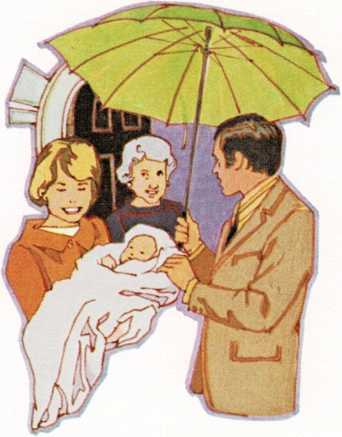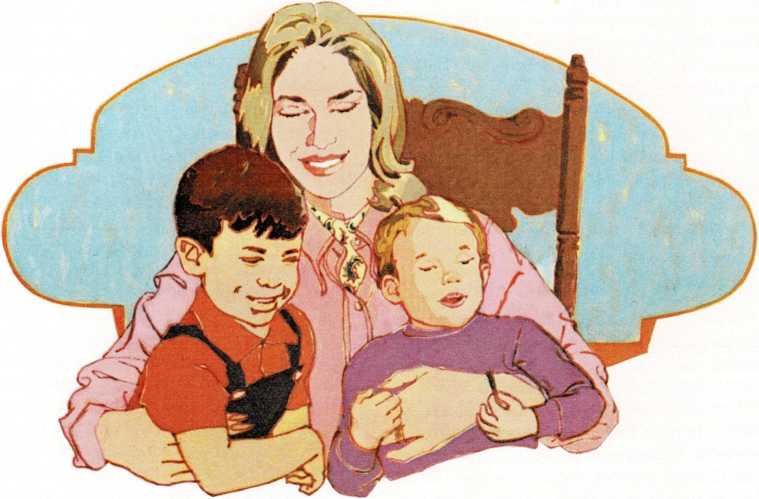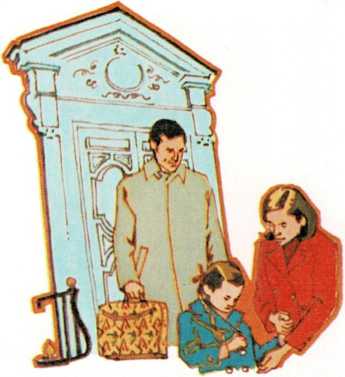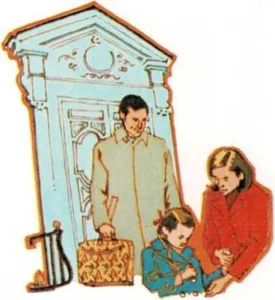Adoption
By Eda LeShan, B.S., M.A.
A couple considering adoption should be as clear as possible about why
they’re doing it. Many childless couples feel they have failed as men
and women. In addition to feeling frustrated and disappointed, they may
even feel guilty or angry. Sometimes they feel their marriage is
threatened or become ashamed, afraid they are “losing face” with friends
and relatives. Some couples think adopting a child will help them
fulfill their own unrealized ambitions. None of these are good reasons
for adopting a child.
A couple should adopt a child primarily because they want the joys and
challenge of being parents—not because the child may be the means of
correcting an unsuccessful marriage, or of giving them status with
friends and relatives. A couple is ready to adopt a child only when they
respect themselves as human beings worthy and ready to offer love and
understanding, and when they can accept what every parent must accept—
the fact that there is no way of knowing exactly what a child will be
like.
Social agencies can help
Because motives and feelings are so important when adopting, it is wise
to consult legally recognized social agencies about adoption. Carefully
trained, experienced workers can help a couple explore their
motivations, give them advice and guidance, and explain the importance
of legal protection. A couple that adopts a child through sources that
are neither recognized nor licensed cannot always be sure that the child
is legally available for adoption. There is always the possibility that
the biological parents may change their minds and want
the child returned to them. Also, independent sources are usually unable
to provide the kind of information and advice that agencies can provide
through the experienced study that is done to make the adoption most
satisfying for the child and the adopting parents.
A social agency is the best source for ensuring maximum help and
continued assistance. Information about recognized public and private
agencies is available through state welfare authorities such as the
state department of public welfare, the department of public assistance,
or the state department of social welfare.
Because of advances in child psychology, as well as changing
circumstances, many

Parents should adopt a child only through a licensed agency.
agencies now have more flexible adoption rales and regulations. Factors
such as race, religion, age, and background are not as restrictive as
they used to be. In general, there is increasing awareness of the
importance of family experience in every child’s life. However, fewer
babies are available for adoption than ever before. Many people use some
form of birth control, and more unmarried mothers keep their babies. But
older children, and those with special problems, are available. Many
couples thinking of adoption consider one of these children.
How it feels to be the parents of an adopted child
Parents of an adopted child experience all the joys and satisfactions of
natural parents. They also experience all the normal problems,
challenges, and stresses. But having an adopted child is not exactly the
same as having a child of your own—mainly because parents who adopt
tend to be too hard on themselves.
All parents sometimes wonder whether they are doing a good job when
their child is unhappy, naughty, angry, fearful, shy, bossy, or jealous.
But parents who adopt are likely to be extrasensitive to such behavior.
When their child misbehaves, they often jump to the conclusion that
somehow they are inadequate as parents.
If parents employ love, support, and guidance as the basic ingredients
for helping the child grow, and if they can anticipate the unfolding of
their child’s unique qualities with interest and joy, they need have no
fear about their ability to be good parents.
Talking to the adopted child
Children should be told that they are adopted. Sooner or later they will
find out anyway. Some parents find the easiest way to introduce the word
“adoption” is to tell children about themselves as tiny babies. All
children love to hear stories about their babyhood. Sometimes the
opportunity may come through looking at pictures in an album, or telling
or reading a story about an adopted child. It is wise to postpone any
detailed discussion until the child is 6 or 7
years old. Before then, when the child asks for details about the
adoption, it is possible for you to say with complete honesty, “There
are things you cannot understand until you are older. I will tell you
then.”
Usually, it is a good idea to explain to close friends and relatives how
you are handling the subject of adoption with the child. If the
groundwork has been properly prepared, it will not matter if someone
says something to the child that represents a different point of view.
The child’s questions about adoption will change as the child grows
older. At first, the child will be interested only in the circumstances
that brought him or her to you. At 7 or 8, the child may begin to ask
questions about the birth parents. When answering such questions, try to
keep the lines of communication open so that the child will feel free to
ask you questions whenever confused or troubled. If questions are
brashed aside, the child might find it difficult to share important
feelings with you. The information the child asks for is secondary to
the sharing of feelings.
Do not sentimentalize or romanticize the facts of the adoption. You can
tell the child that there were good reasons for the adoption, that the
biological parents were concerned for their child’s welfare, and that
giving the child up was an act of responsibility and caring.
Yet, no matter how good the reasons for adoption are, some children may
feel that their birth parents gave them away because they were defective
in some way. Even when the adoptive parents tell the children that they
were adorable, beautiful children, and show baby pictures to prove it,
the children may still have feelings of rejection. To a young child, it
is incredible that parents would give away their baby unless there was
something wrong with the baby. Such feelings of rejection may leave an
emotional scar, especially in a child who is particularly sensitive. But
this is true of many life experiences. It is true of the child who is
lame, or sickly, or slower to learn than other children the same age.
Every child has some feelings of being different. But, in general,
children are strong enough to face almost any reality if it is shared
with loving parents.
Some special problems
Even though all parents face similar problems with their children,
adoptive parents may encounter special problems that arise because of
the fact that they have adopted. Here are three of them.
Brothers and sisters
In any family, children will at times resent or be jealous of each
other. They will quarrel, bully each other, and fight. But they will
also enjoy each other’s companionship, fight for each other when
threatened by outsiders, and on occasion even team up against their
parents.
In families made up of both biological and adopted children, parents
sometimes create problems by singling out the adopted children for
special attention. Often this is done in the mistaken belief that the
adopted children will feel more secure. Usually the result is just the
opposite. The adopted children are made aware that somehow they really
are different from the others. They may even think they are being given
favored treatment because they are not as capable as the other children
in the family. At the
same time, the biological children may feel a growing resentment against
the adopted ones because the biological children feel cheated. Parents
must take care to make it quite clear that each of their children—
biological or adopted—is loved.
Adopting an older child
Adopting older children may involve other kinds of problems. Older
children may remember their biological families, or they may have had
trouble adjusting in other settings—such as orphanages or foster
homes. An older child’s adjustment to an adoptive family will be made
easier if the child is helped to share memories and feelings with the
new family. An older child needs a bridge between the past and the
present to face the future. Adopting parents may have to face the fact
that children who have been deprived of love and acceptance will
constantly test their adoptive parents to see if indeed the parents will
love them and keep them, even when they misbehave. During such an
adjustment, which is hard on both parents and child, an adoption agency
can play an important part in guiding the

When a family has an adopted child and natural child, a parent must
make it clear that each of the children is loved.

Adopting an older child may present special problems as well as
pleasures. Contact the adoption agency if you have any problems.
family toward a solution. Patience, compassion, and the readiness to ask
for expert help are some of the basics necessary for the successful
adoption of an older child.
The search
Instances of extreme curiosity about the biological parents rarely occur
in the adopted child. Usually, the child feels so close to the adoptive
parents, that the idea of onee being part of another family seems
unreal. But should the child raise the question of a search for the
biological parents, the adoptive parents should understand the child’s
curiosity without letting it lead to any action. Usually, the child is
not truly concerned in searching for the biological parents. In raising
the question of a search, the child may just be testing the adoptive
parents and may be saying, “Prove that you are more my parents than
those who brought me into the world.” If the child persists in the
search, it should be pointed out that the natural parents’ decision to
give up their child must be respected; that whatever the circumstances,
it was a difficult decision for them to make and it must have been
necessary for the child’s well-being.
According to adoption laws, search for parents is not desirable. Most
states have laws requiring that a court order be obtained before
adoption records can be seen,
and the order is issued only under the most unusual and special
circumstances.
Many young adults who are adopted seek out their biological parents,
with varied results. Occasionally, there is disappointment when the
biological parents are found. Many abandon the search and strengthen the
bond with the adoptive parents.
Adoption and the law
Usually, an adoption decree ends all rights and duties between the child
and the biological parents, and makes the child the legal child of the
adoptive parents. The adopting parents become responsible for the
child’s education, care, and support. Each state and territory has its
own adoption laws. When adopting parents and the child they seek to
adopt live in different states, the adoption is governed by the law of
the state where the adoption proceedings are brought, and the adopting
parents must comply with the law of that state if the adoption is to be
legally binding.
Almost all states issue a new birth certificate for the adopted child.
This bears no information about the biological parents. It does not
indicate in any way that the child is adopted. The new birth certificate
carries the child’s new name and the names of the adopting parents.
Also, most states have laws or statutes making all proceedings in an
adoption secret. The old birth certificate is sealed and filed. It may
be obtained only under court order.
In matters of inheritance, the adopted child is entitled to inherit
property from the adoptive parents except when a will states that
inheritance is restricted to “heirs of the body.” Some states bar an
adopted child from inheriting property from the biological parents or
other blood relatives. But other states prohibit the adopted child from
“being debarred from inheriting” from biological parents or other blood
relatives.
Laws pertaining to inheritance by adopted children vary from state to
state. Information about inheritance, as well as any laws governing
adoption, may be obtained from the state welfare authority in your state
or from the social agency that handled your child’s adoption.

